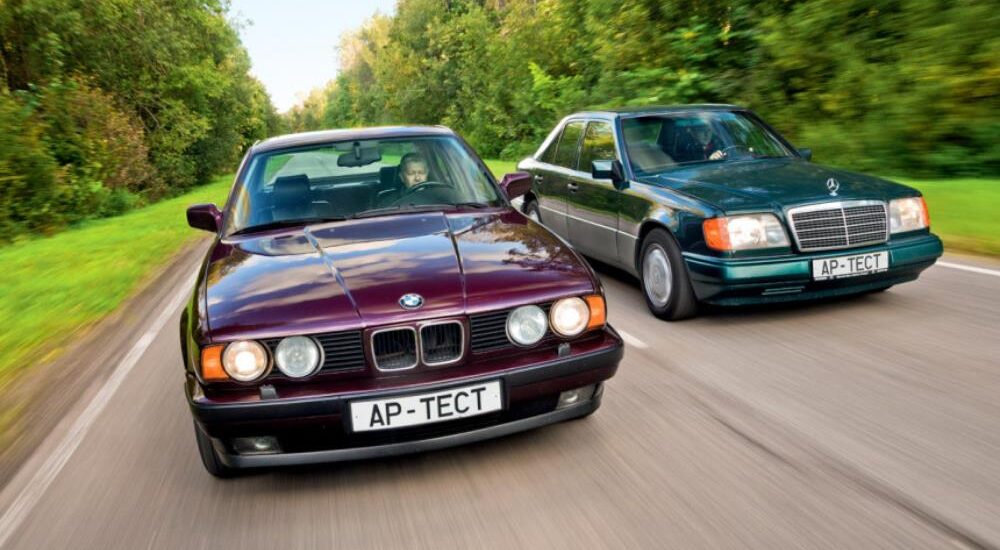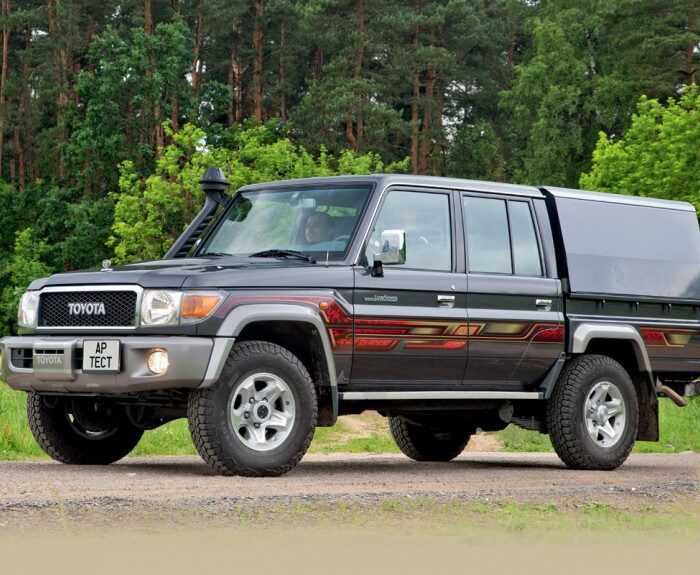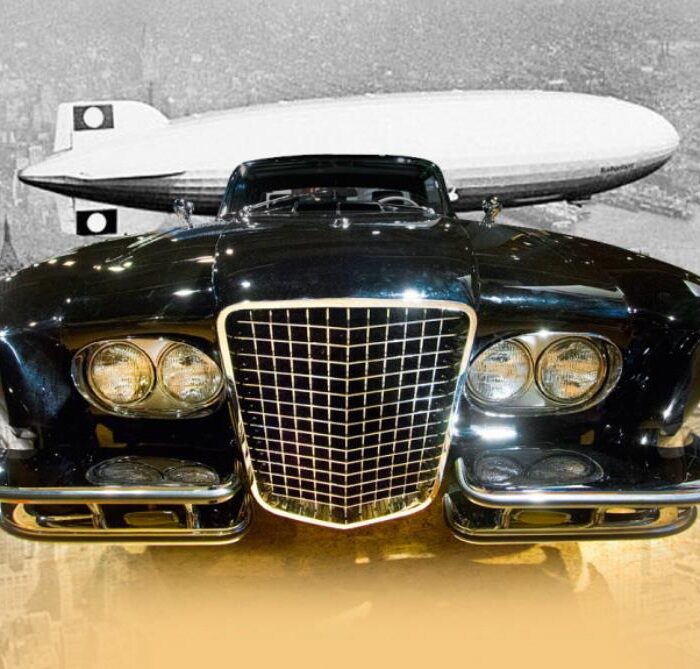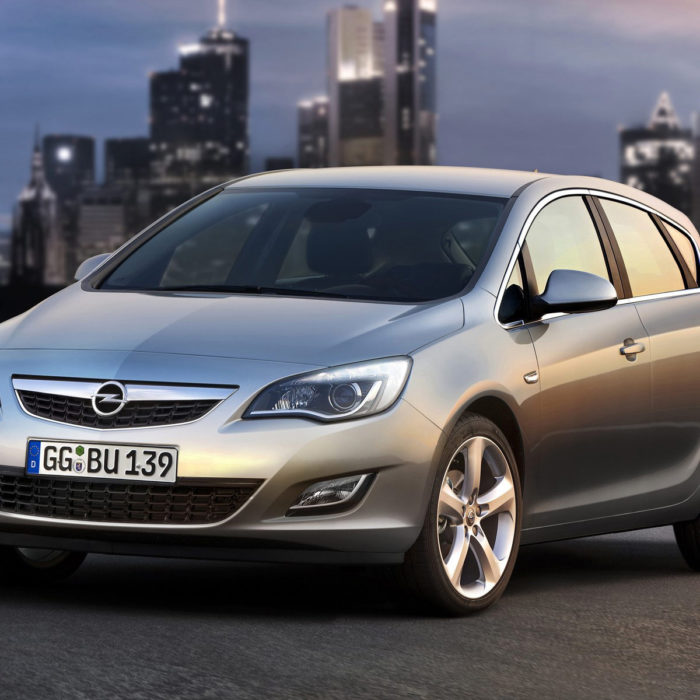Lorsque je me suis lancé dans cette série de tests de voitures rétro, je ne m’attendais pas à des surprises. Après tout, il est clair qu’une VAZ “nine” surpasse une Moskvich de 41 et qu’une Volga est difficilement gérable. Mais s’aventurer sur le terrain des modèles internationaux s’est avéré plus révélateur. Saviez-vous que la Mercedes W123 est une véritable voiture de conduite, tandis que la Mustang classique n’est qu’un simple objet de décoration ? Abordons maintenant un duo apparemment prévisible : la BMW 535i de la série E34 et la Mercedes-Benz E280 de la génération W124. Attendez-vous à l’inattendu.

Sous le capot et au-delà
La meilleure façon d’apprendre à connaître les E34 et W124 n’est pas seulement de les conduire, mais de les examiner sur un pont élévateur. Ce point de vue est le plus révélateur de la sophistication du design et de l’investissement dans le développement de chaque modèle. La plupart de ces voitures sont aujourd’hui plus usées qu’on ne pourrait le penser, ce qui met en évidence les contrastes marqués qui existent entre elles.

Il est intéressant de noter qu’à partir du moteur M30B35, la berline la plus rapide de la carrosserie E34 – l’Alpina B10 Biturbo – a été créée. Une paire de turbocompresseurs Garrett T25 a permis de faire passer la puissance de 211 à 360 chevaux. L’accélération jusqu’à “cent” prend un peu plus de cinq secondes, et la vitesse maximale atteint 290 km/h. On se demande alors à quoi ressemblait le décalage du turbo.
La Mercedes W124 est un exemple classique de suringénierie. Sa construction robuste remonte à 1984 et s’inspire initialement de la berline compacte W201. La W124 se caractérise par de grands longerons, des sous-châssis substantiels, des jambes de force McPherson avec ressorts et amortisseurs séparés, une suspension arrière sophistiquée à cinq bras, des bras robustes, des rotules, un soubassement plat, des accouplements élastiques doubles sur l’arbre de transmission et des supports hydrauliques pour le groupe motopropulseur. En examinant la E34 de BMW, on peut s’interroger sur ses dates de production : la W124 peut-elle vraiment la précéder de trois ans ? La configuration de BMW semble plus datée, utilisant une technologie plus simple qui n’a pas connu de mises à jour significatives avant l’arrivée de la série 1990.

L’intérieur de la “five”, en particulier avec le volant sport à trois branches, est beaucoup plus orienté vers le conducteur que les réglages du châssis. La position assise basse, l’ergonomie bien pensée, où l’on n’a guère besoin de quitter la route des yeux pour régler la “climatisation” ou le système audio. Après le lifting, les boutons ronds confortables ont été remplacés par des roues, comme dans une Mercedes. Et voici le dernier “cinq” avec des boutons de fenêtre sur le tunnel central.

Il y a trente ans, à Munich, ils ont trouvé le format idéal pour les instruments. Et il est dommage qu’ils aient dû, par la suite, le gâcher délibérément – regardez les échelles dessinées des BMW actuelles. La zone rouge du tachymètre commence juste après 6000 tr/min – le moteur M30B35 n’aime pas tourner.
Cependant, la configuration plus simple de la BMW n’a pas empêché la M3 E30 de surpasser la Mercedes 190E Evo, ce qui suggère que la complexité brute n’est pas toujours en corrélation avec une conduite supérieure. C’est pourquoi je réserve mon jugement, pour l’instant.

En termes de dimensions, la série “cinq” de l’E34 reprend pratiquement la série “trois” actuelle, de même que l’espace pour les jambes à l’arrière : si vous êtes de taille supérieure à la moyenne, ne comptez pas sur le confort.

Il y a trente ans, fumer était à la mode : il y a un cendrier dans chaque portière arrière et des briquets à l’avant et à l’arrière.
BMW 535i E34 : l’ingénierie d’un classique
La BMW 535i E34, équipée du vénérable moteur M30 à simple arbre à cames, est souvent considérée comme l’une des meilleures “Fives”. Pour accéder au moteur, il suffit de tirer sur le levier qui soulève gracieusement l’avant du capot. Le design du moteur, en particulier le collecteur d’admission qui pourrait figurer dans un musée du design, en dit long sur l’attention portée par BMW aux détails. Malgré sa taille (3,4 litres et six cylindres de 92 mm de diamètre), les 208 ch du moteur semblent modestes par rapport à sa masse de 1607 kg (contre 1585 kg pour la Mercedes). Mais associé à une boîte de vitesses manuelle à cinq rapports et à un différentiel à glissement limité, ainsi qu’à l’asphalte frais, le potentiel de la voiture semble renouvelé.
Mais est-elle vraiment performante ?

Le coffre est pratique et spacieux, et quelques élastiques sur le plancher ont survécu jusqu’à aujourd’hui, tout comme dans mon coupé E82.

Il fut un temps où la roue de secours ne gênait pas les concepteurs de BMW.

Votre jeune a t-il un ensemble complet d’outils de signature ? Le contenu de ce coffre fait la fierté de tout propriétaire d’une vieille BMW.
Pas seulement une voiture, mais un “outil”
Cette BMW 535i est peut-être l’un des plus beaux exemples du pays. Elle a été restaurée méticuleusement pendant plusieurs années pour retrouver un état proche de l’original. L’habitacle exhale le parfum du cuir riche et des plastiques texturés, avec des sièges confortables et un tableau de bord doté de jauges authentiquement classiques, ce qui est rare sur les BMW modernes.
Le “six” en ligne de la voiture ronronne plus profondément au ralenti que le V8 d’une BMW 740i. La boîte de vitesses est inhabituellement précise pour une BMW, sans le long débattement typique dans l’habitacle, bien que le point d’engagement soit subtil. Le couple du moteur facilite les départs, mais ne vous attendez pas à des accélérations fulgurantes : il ne s’agit pas d’une voiture de sport moderne. Pourtant, sur la piste d’essai, la “Five” dépasse ses spécifications officielles, passant de 100 km/h en 7,6 secondes avec une vitesse de pointe de 237 km/h, et gardant son sang-froid même à grande vitesse.

Ne vous laissez pas tromper par la photo dramatique : la E34 standard résiste à ce type de conduite sur un asphalte sec.
Mais il y a un hic. La 535i réagit lentement aux sollicitations de la direction. C’est presque comme si la voiture résistait aux manœuvres rapides, exigeant d’importants tours de roue pour négocier les virages serrés. Conduite rapide et réactive ? Ce n’est pas son point fort. Cette BMW ne vous incite pas à la pousser à fond ; elle est compétente et sûre, mais d’une manière ou d’une autre, décevante et directe.

BMW contre Mercedes : Les aspects intangibles
Face à la Mercedes, que j’ai eu le plaisir de conduire de Moscou au circuit d’essai, la BMW semble décevante. La Mercedes ne se contente pas d’égaler la BMW, elle renforce chaque conduite par un sentiment de sécurité, une aura de noblesse et une fréquence mystérieusement satisfaisante de vibrations corporelles qui résonnent inconsciemment chez les aficionados de la Mercedes.

En revanche, l’intérieur de la BMW, malgré son équipement technologique, n’a pas l’âme qui rend la Mercedes si captivante. La E280 ne se contente pas de bouger, elle glisse avec une subtilité qui rend chaque trajet sans effort et chaque kilomètre plus doux.

Je n’aimais pas les intérieurs des Mercedes de cette époque, mais j’apprécie désormais ce style minimaliste. Il est dommage que les bons tissus aient disparu des cabines des classes E modernes – je pense que ces garnitures sont plus douillettes que le cuir.
Ainsi, même si cela me fait mal de le dire, la BMW 535 E34 est peut-être une merveille de son temps, mais dans ce face-à-face, la Mercedes-Benz E280 W124 ne se contente pas d’être une référence, elle l’établit.

Les instruments classiques avec horloge se distinguent par leur éclairage extérieur original, comme sur une scène de théâtre. La version de BMW, où les symboles eux-mêmes s’allument, est certainement plus moderne, mais Mercedes crée une atmosphère particulièrement apaisante sur une route de nuit.
Prouesses du groupe motopropulseur et parité des performances
Pour une comparaison d’une précision irréprochable, j’aurais idéalement recherché une W124 d’avant le lifting, équipée d’un “six” à simple arbre à cames. Cependant, le modèle en question est équipé du moteur M104 de 193 ch, plus évolué. Bien qu’il accuse un léger retard en accélération à l’arrêt par rapport à son concurrent, le processus d’échange de gaz supérieur de ce moteur garantit une meilleure élasticité, et notre Mercedes est également équipée d’une boîte de vitesses manuelle à cinq rapports. Mais ce qui distingue vraiment les performances de la Mercedes, c’est la subtilité de ses accélérations, pratiquement imperceptibles.

Un siège avec un coussin à ressort et un large dossier vous accueille comme un membre de la famille, mais il vous retient difficilement dans les virages.


La puissance furtive de la W124
Cette Mercedes décolle avec une douceur incroyable, comme un véhicule électrique. Le moteur reste pratiquement silencieux jusqu’à ce qu’il atteigne 5 000 tr/min, et seul le compte-tours trahit l’activité sous le capot. Chaque pression sur l’accélérateur se fait en douceur, comme s’il n’y avait pas de transmission mécanique – pas de boîte de vitesses, d’arbre de transmission ou de différentiel en vue. Mercedes est passée maître dans l’art de masquer les processus mécaniques, faisant en sorte que l’expérience de conduite ressemble moins à l’utilisation d’une machine qu’au maniement d’un instrument de luxe finement réglé.

Ces moteurs à 24 soupapes de la famille M104 ont acquis la réputation d’être parmi les plus fiables de l’histoire. Remarquez le chauffage intégré dans le réservoir du lave-glace. Mercedes regorge de solutions astucieuses de ce type.

La capuche de l’alligator peut être relevée presque à la verticale.
Toutefois, cette douceur ne doit pas être confondue avec un manque de vigueur. Quand il le faut, la W124 peut facilement franchir la barre des 200 km/h et prendre rapidement la tête au feu rouge. En outre, sa tenue de route est bien plus contemporaine que celle de la BMW.

La hauteur du canapé, le positionnement des accoudoirs sur les portes, l’angle du dossier sont parfaitement réglés. L’espace pour les jambes dans la classe E est comparable à celui d’une Camry contemporaine.
Une étude de la direction et de la stabilité
Dès le premier tour de volant, il est évident que ces véhicules sont issus d’époques distinctes. La Classe E est nettement plus réactive, avec des réactions qui pourraient rivaliser avec celles des véhicules modernes. La maniabilité affirmée de la Mercedes peut sembler écrasante au début, mais elle devient rapidement une caractéristique appréciée, offrant un retour d’information précis sans compromettre l’informativité. Malgré un roulis important, similaire à celui de la BMW, il ne nuit pas à la précision de la trajectoire de la voiture, en partie grâce à sa suspension arrière avancée à cinq bras qui améliore l’engagement des roues extérieures.

Caractéristiques innovantes et points forts en matière de maniabilité
Notre véhicule d’essai était équipé de l’ASD (Automatisches Sperrdifferenzial) en option, un différentiel arrière autobloquant qui utilise un mécanisme hydraulique pour améliorer la traction – particulièrement efficace en dessous de 38 km/h. Lorsque c’est nécessaire, le différentiel se bloque complètement, améliorant ainsi l’adhérence et la maniabilité lors de manœuvres agressives. Cette caractéristique illustre la manière dont la Mercedes effectue sans effort des glissades en puissance, renversant les normes automobiles et mettant en évidence ses capacités de maniabilité supérieures.

Il n’est pas possible d’augmenter le volume de ce coffre : derrière le dossier, un réservoir de carburant est installé verticalement.

Bien entendu, il existe un créneau pour une roue de secours de taille normale.

La documentation d’origine du concessionnaire est un bonus agréable pour tout youngtimer.
Le confort inégalé de Mercedes
La Classe E ne se contente pas d’exceller en termes de performances : elle offre un niveau de confort exceptionnel, propre à Mercedes. De son confort de roulement à son insonorisation remarquable, elle place la barre très haut. Étonnamment, la suspension de la BMW se comporte aussi admirablement sur les surfaces irrégulières, bien qu’elle ait un peu de mal avec les petites bosses – un trait particulier compte tenu du profil généreux de ses pneus.

Conclusion : L’héritage de la W124
N’en déplaise aux amateurs de BMW, dans les années 80, Mercedes régnait en maître, non seulement sur son homologue allemand, mais aussi sur ses propres versions ultérieures. Aucun modèle ultérieur de Classe E n’a réussi à retrouver le mélange d’élégance, de performance et d’innovation technologique que la W124 offrait sans effort. L’interaction avec cette voiture, qu’il s’agisse de la satisfaction tactile de son levier de vitesse manuel ou de l’importance historique de son ingénierie, est un rappel de l’âge d’or de Mercedes. Pour ceux qui recherchent un classique qui représente vraiment le sommet des réalisations automobiles passées, la W124 est la référence E définitive.
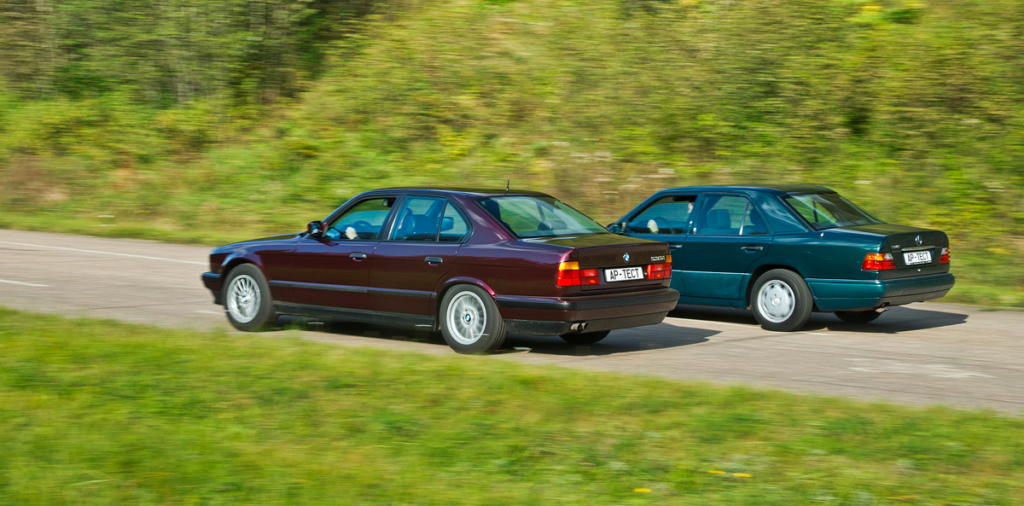
Photo : Dmitry Pitersky
Il s’agit d’une traduction. Vous pouvez lire l’article original ici : BMW 535i серии E34 и Mercedes-Benz E280 поколения W124 : кто из них настоящий E-талон ?

Publié Juillet 04, 2024 • 11m à lire

